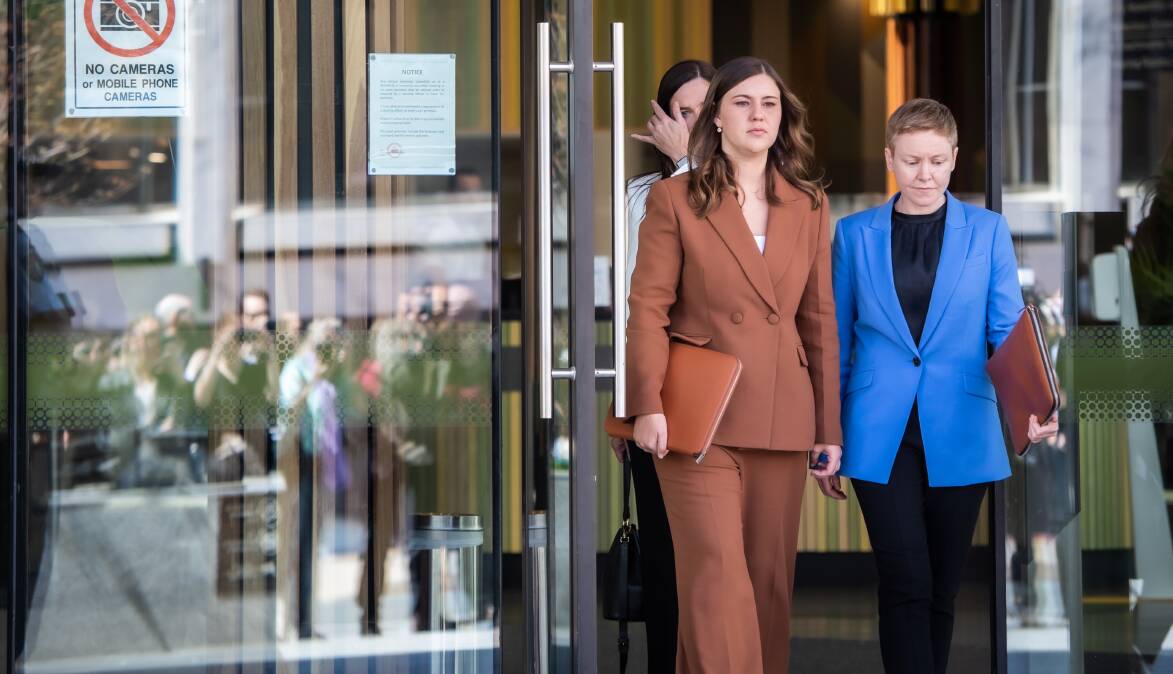
A senior detective has hit back at criticism of a scathing report he wrote about Brittany Higgins, saying it is "a little bit unfair" to suggest it is one-sided when it included a link to all the evidence police had gathered.
Detective Superintendent Scott Moller took the stand on Monday at an inquiry into the aborted case of Bruce Lehrmann, who denies raping Ms Higgins at Parliament House when the pair were Liberal Party staffers.
The independent probe, led by former Queensland judge Walter Sofronoff KC, is scrutinising the actions of police, Director of Public Prosecutions Shane Drumgold SC and Victims of Crime Commissioner Heidi Yates.
In the inquiry's early stages, Mr Drumgold blasted Detective Superintendent Moller for writing an "extraordinary" report that said Ms Higgins had been "evasive, uncooperative and manipulative".
Detective Superintendent Moller wrote the two-and-a-half-page executive briefing in June 2021, when he provided it to his boss, Commander Michael Chew, for advice on what to do next as police weighed up whether to charge Mr Lehrmann.

He agreed with counsel assisting the inquiry, Joshua Jones, that he believed at that stage there was insufficient evidence to charge Mr Lehrmann.
Detective Superintendent Moller also conceded neither his report, nor a minute authored by Detective Inspector Marcus Boorman and attached to the executive briefing, detailed alleged lies told by Mr Lehrmann.
Inquiry chairman Walter Soronoff KC asked Detective Superintendent Moller on Monday if his report therefore contained "a one-sided view" of the case.
The detective said he would accept that if he had provided "persuasive writing" and nothing more.
But he said he was merely highlighting the issues that most concerned him, and noted the document gave Commander Chew instructions on how to access the entire brief of evidence.
"I'm saying, 'If you don't consider my view is enough, please access the file path and read the evidence yourself'," Detective Superintendent Moller said.
Police under 'significant pressure'

Earlier on Monday, Detective Superintendent Moller detailed how investigators had felt "significant pressure" from the media, Ms Higgins and within the police to progress the case during the investigative phase.
He gave an example of this in a written statement, which described him bumping into Australian Federal Police Commissioner Reece Kershaw while jogging around Lake Burley Griffin early one morning.
He wrote that the commissioner had inquired about the progress of the investigation.
"This is an example of how much pressure was on everyone involved with this matter," Detective Superintendent Moller wrote.
"The Commissioner and I could not even take private time to exercise without this being a topic that was immediately raised for discussion."
In his oral evidence, Detective Superintendent Moller also revealed the toll taken on his fellow officers.
"A number of police who worked for me have been unable to return to work because the stresses involved in this investigation," he told the inquiry.
Moller admits 'mistake'

On the witness stand, Detective Superintendent Moller also admitted police had made "a mistake" when they gave Mr Lehrmann's former barrister a brief of evidence that contained Ms Higgins' confidential counselling notes.
He said no one had "specifically turned their minds to" the fact that material was included.
"We shouldn't have given them," Detective Superintendent Moller admitted.
"That's the bottom line."
'Ongoing battle' for police

Prior to the lunch adjournment on Monday, Mr Jones challenged Detective Superintendent Moller about why police had conducted two interviews with Ms Higgins despite concerns for her mental health.
Detective Superintendent Moller accepted such interviews were "traumatic" but defended the decision to conduct the second one, saying police felt obliged to clarify "inconsistencies" in the evidence.
He said investigators were consistently "torn" between efforts to support sexual assault complainants as part of a "victim-centric" approach, and being as thorough as possible when collecting evidence.
"It's an ongoing battle for us, and it's hard," Detective Superintendent Moller told the inquiry.
DPP 'collecting evidence' to criticise

Detective Superintendent Moller also revealed he had believed, during the investigation of Ms Higgins' allegations, that Mr Drumgold was "collecting evidence" on police in order to criticise them.
"It caused me quite a lot of concern for myself and my investigation team, so much so that we continually second-guessed ourselves about what we were doing and how we were doing it," he said.
Detective Superintendent Moller, the first police witness to give evidence, is set to be cross-examined by Mr Drumgold's barrister, Mark Tedeschi KC, on Tuesday.







